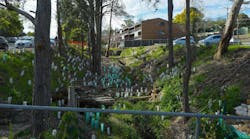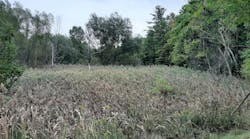Packaging Know-How
At IECA’s Annual Conference & Expo, many of you will be taking the CPESC review course, on your way to joining the thousand or so Certified Professionals in Erosion and Sediment Control. It seems like a good chance to remember what those five letters can do for you. For starters – as people know in Illinois – they help close the gap between what you do and what others think you can do. The Illinois Department of Agriculture (IDOA) is driving home that point for technical staff in some of its 98 Soil and Water Conservation Districts (SWCDs). Though they’ve traditionally dealt with soil conservation practices on cropland, these resource conservationists, as they’re known, are increasingly working on urban conservation too. As NPDES Phase II looms closer, they’re being sought for their expertise in urban stormwater runoff management, erosion control, and sediment retention. The problem is that while most are qualified to deal with these issuesRealizing certification could help build credibility, IDOA two years ago offered to pay the application fee and cost of the training modules for any SWCD employee who qualified to take the CPESC exam. At the first IDOA-sponsored exam in 1999, two Natural Resource Conservation Service and 17 SWCD employees passed the test. Today, about 30% of SWCD technical personnel are CPESCs. Some cities’ ordinances now call for a CPESC, rather than an engineer, to review proposed ESC plans.For Tim McMahon, Lake Decatur watershed technician with the Macon County SWCD, the certification is piece of ammunition he’s used in the fight to get a county stormwater management and erosion control ordinance passed. “We thought this certification would give us some credibility among engineers and county and city officials, which it definitely has. Even though we did the same thing before, they didn’t look at it that way. If you don’t have ‘P.E.’ behind your name, they don’t look at you twice. But when they see ‘CPESC,’ it shows that you have qualifications.” Still, there are always reminders that understanding is by no means universal: McMahon says he was called a “special interest group” at one of the meetings to discuss the ordinance.Recognized expertise can also help bridge the gaps between conflicting local requirements. “We are inundated with development,” says Ed Weskerna, district manager of McHenry County’s SWCD. “There’s a lot of conflict that results, such as one municipality taking a different look at erosion control than another would. Developers will take advantage of that. They’re pitting one municipality against another in trying to ignore or reduce the requirements for erosion control on their construction sites.” The county is now developing a countywide stormwater management plan, and Weskerna’s office was approached to help formulate the ESC portion. He believes the certification had a lot to do with that request.A CPESC since 1994, he says, “It’s given me self-confidence in dealing with engineers who are creating erosion control plans. It gives me the stamp of approval, so to speak, because I have a certification behind me from a professional organization, just as an engineer has a registration. So we’re looking upon each other as equals when they create the plan and I review it.”The knowledge is what’s important, but it’s often the packaging that gets the knowledge where it needs to be.

